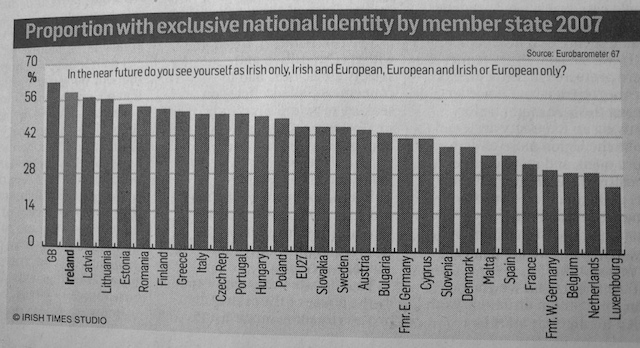
Back gate to a Cambridge college.


Back gate to a Cambridge college.

This chart (which appears in today’s Irish Times) is very illuminating — and puzzling. It’s based on the Eurobarometer survey conducted in the Spring of 2007. Interviewees were asked: “In the near future, do you see yourself as Irish only, Irish and European, European and Irish, or European only?”
Ireland is nearly at the extreme left of the chart. Only the UK has a stronger sense of non-European identity. The founding countries of the EU are all clustered on the extreme right.
What’s puzzling is that Ireland has done incredibly well out of the EU, whereas Britain probably hasn’t. Looks like my countrymen are a pretty ungrateful lot!
“The people have spoken…” was the mantra on every Irish politican’s lips last night, but the added rider (“…the bastards”) was thought rather than uttered.
The aftermath of the referendum result is fascinating. Here’s Stephen Collins, the Political Editor of the Irish Times, talking about it.
What’s interesting about Collins’s view is how conditioned it is by the government mindset. “We’ve blotted our copybook. Now what will the Big Boys in Brussels do to us?” is the general tenor of the shell-shocked Irish political establishment. In fact — as Fintan ‘Curate’ O’Toole pointed out this morning — fear and nameless dread were the hallmarks of both the Yes and No campaigns.
The various No campaigns formed a loud (if dissonant) orchestra of anxieties — about taxation, abortion, militarisation. We were even treated to stickers of a nuclear mushroom cloud, as if Lisbon was a suburb or Armageddon.
But the Yes side indulged in its own brand of counter-terror. While the No campaign was scaring us with what would happen if we voted for Lisbon, the Yes side told us hair-raising tales of what might happen if we didn;t — shame, isolation, disinvestment. It managed the extraordinary trick of making the word Yes sound anything but positive. In essence, voters were being asked what brand of trepidation they wanted to buy.
Step outside the establishment bubble, however, and things look a bit different. Irish Times columnist Breda O’Brien wrote that
Some concerns [of the No campaigners] were unfounded. But to give just one example, worries about increasing militarisation of the Union were well-founded.
There was a dissonance between those painting the EU as the reason why there has been an end to war on the Continent, while at the same time beefing up the military capacity It was just one example of a dissonance between rhetoric and reality.
There is, she continues,
a massive need to work on understanding why people right across Europe are not persuaded that the EU represents something truly worthy of loyalty and allegiance. There is a reason why people are suspicious of vast moniliths, and it is not just paranoia. Monoliths tend to crush those who do not agree with them, and then be crushed in their turn when they become too arrogant to be endured. the Irish have done Europe a favour, though it is unlikely it will be seen in this regard.
The No campaign was run by a weird ragbag of right- and left-wing nutters. I was convinced that, in the end, my countrymen would be so worried by the prospect of an impending recession that they would vote for the Treaty, on the grounds that that was a way of reducing uncertainty about the future. But I reckoned without the incompetence of the Irish political establishment, who ran an abysmal campaign from (late) start to finish. The government dithered about the date of the Referendum, and was fatally distracted by the struggle to dump Bertie Ahearn. So, as Garret FitzGerald (himself a former Taoiseach) put it,
during the early months of the year the anti-treaty forces of the two extremes — a lethal combination of people reflecting right-wing US military and neo-con antipathy to the EU (seen by them as a threat to NATO), together with our own domestic anti-US left-wingers — were given free rein to mislead voters into opposing the treaty on a whole range of irrelevant, misleading or false grounds.
Stephen Collins is also very critical of the Yes campaign.
Of course the Yes campaign had a more complex message to explain but, by comparison, its posters were still remarkably dull. The fact that so many of the mainstream politicians cynically used posters in order to promote their own image rather than the message also did nothing for the Yes campaign.
Garrett FitzGerald has an insightful take on this.
I do not have the impression that our poliicians reflect much, if at all, on the recent loss of confidence in and respect for them. This insensitivity reflects the fact that, in a political system as devoted to clientelism as is ours, elected representatives tend to judge their public standing by the narrow criterion of whether individuals continue to come to them for assistance with personal problems arising from their often fraught dealings with the bureaucratic system.
Spot on. The Irish political system was not designed for handling ideas.
And it cannot have helped either that the Taoiseach as well as Charlie McCreevy (Ireland’s EU Commissioner) revealed that neither of them had read the Treaty. They lost the argument because they failed to take seriously the need to make it.
Now they have to live with the consequences.
While the world’s attention is focussed on my homeland, let us not forget North of the Border, where the Democratic Unionist Party (DUP) now shares power with Sinn Fein. The new First Minister — who succeeded ‘Dr’ Ian Paisley — is Peter Robinson, a freshfaced apparatchik who might, in other circumstances, be confused with a New Labour Minister. As is often the case in Northern Ireland politics, official appointments are a family business with the Robinsons, and his wife Iris is an Assembly member and Chair of its Health Committee.
According to the Irish Times, a few days after Mr Robinson’s elevation to supreme power, Iris caused quite a stir by airing her belief that homosexuals could be “turned around” by psychiatry, and “redeemed by the blood of Christ”. Her views on the “abomination” of homosexuality were published on a week in which homophobic thugs attacked and badly injured a young man in Newtownabbey.
Mrs Robinson also confided her belief that Princess Diana was murdered (presumably by papists acting under the direction of the Duke of Edinburgh) to an interviewer from the Dublin newspaper, the Sunday Tribune.
How does that Simon & Garfunkel song go? Ah, yes:
And here’s to you, Mrs. Robinson,
Jesus loves you more than you will know.
God bless you, please Mrs. Robinson.
Heaven holds a place for those who pray,
Hey, hey, hey